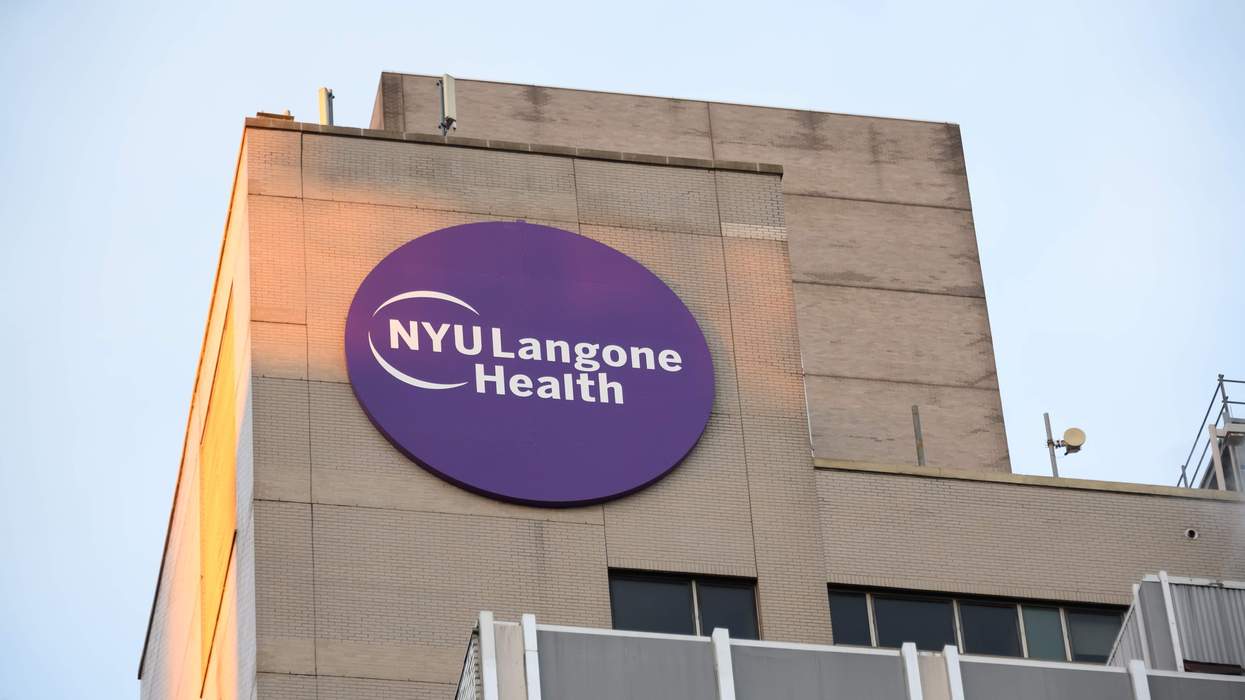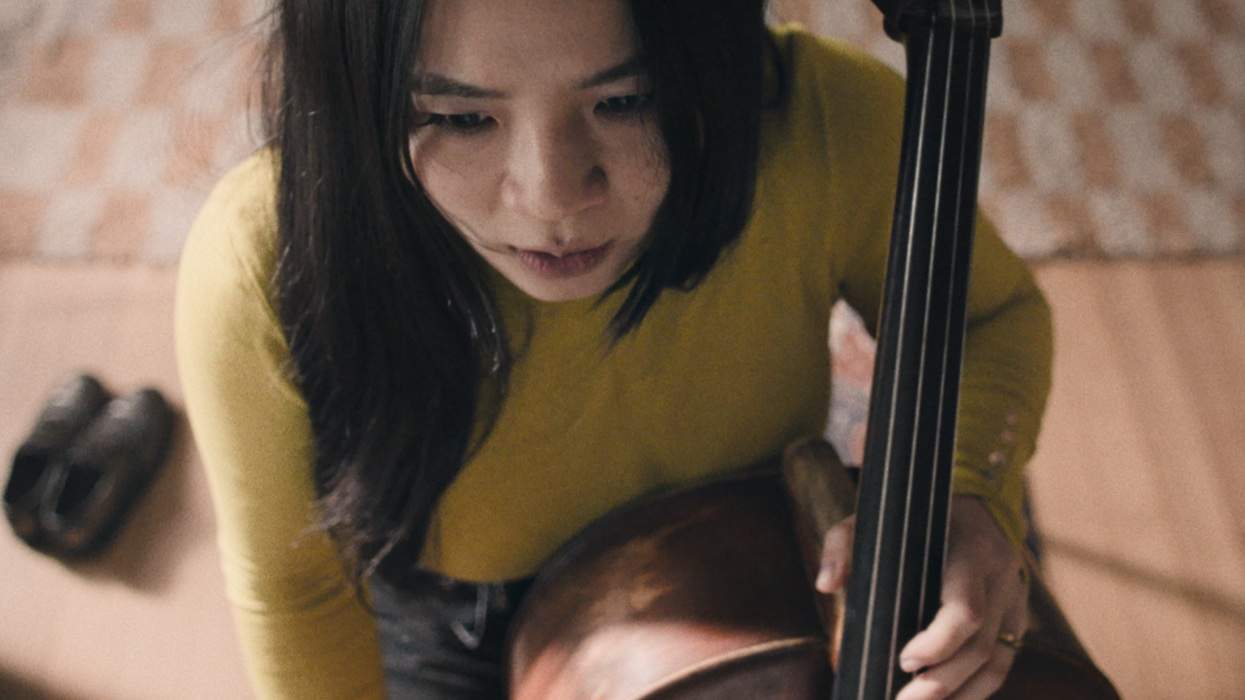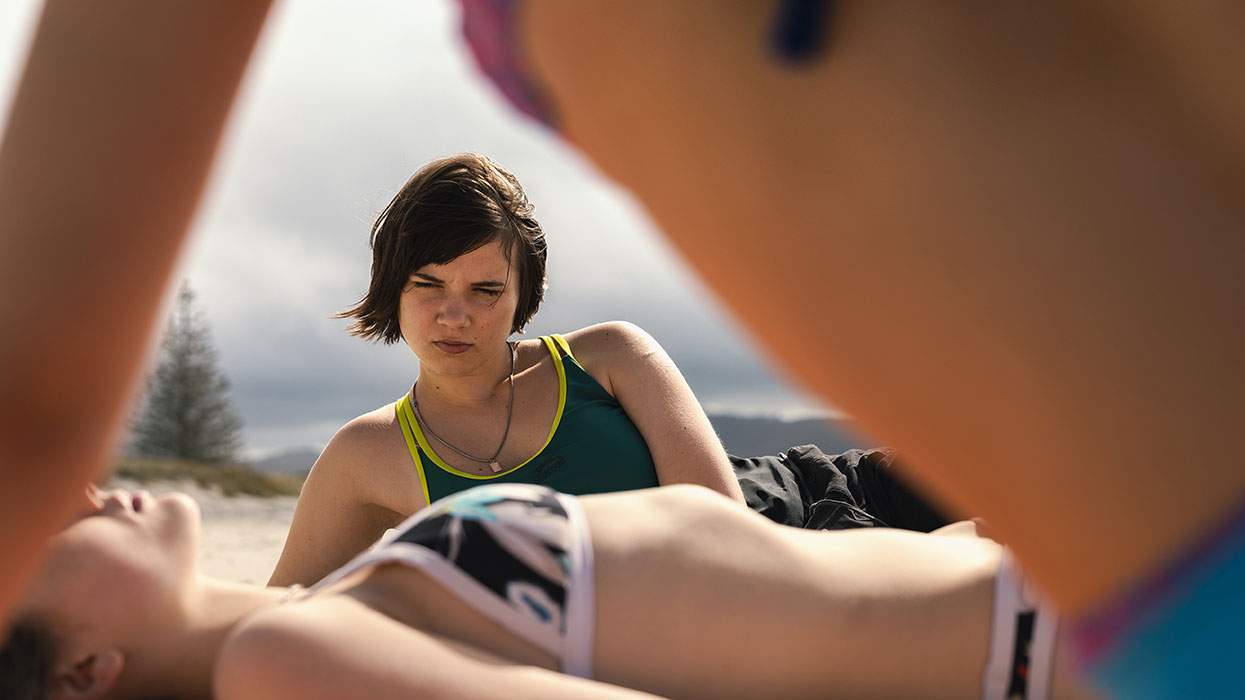Love and Other Disasters
(Written and directed by Alek Keshishian; starring Brittany Murphy, Mathew Rhys, and Santiago Cabrera; 95 min.)
Romantic comedies may tend to feature straight characters, but their scripts often go out to the best and brightest gay screenwriters for a final polish. Judging from examples at this year's Outfest, that gay talent has finally delivered the ultimate rewrite on the romantic comedy: a beat-for-beat romcom formula that just happens to showcase gay characters. It's fitting that the best example of this is Love and Other Disasters, a film so clear about its origins that it begins with a "Fade In" written in Courier New. It's as though director Alek Keshishian (who also helmed the Madonna documentary Truth or Dare) is saying, "Yes, this is going to be your typical romantic comedy with the meet-cutes and the misunderstandings. Now enjoy it." Fortunately, you will.
Jacks (Brittany Murphy) is an intern at British Vogue who's committed to helping her gay roommate Peter (Matthew Rhys of Brothers & Sisters) find love. She thinks she's got Peter's match made when she meets too-cute-to-be-straight Paolo (Santiago Cabrera), but Paolo actually has a crush on Jacks herself, though he can't seem to find the time to let her know that he's hetero. The film stretches this simple misunderstanding out like taffy, but the situations are fun and the fizzy meta appeal hearkens back to Murphy's Clueless days. Of particular note is the blowsy Catherine Tate, who's riotous as Jacks's friend Tallulah Wentworth--with that name and her soused asides, she's sure to become a gay favorite (as will the film itself).
Butch Jamie
(Written, directed by, and starring Michelle Ehlen; 86 min.)
Jamie (writer-director Michelle Ehlen) might be an actress, but she's way too butch to win the feminine roles she keeps auditioning for. Her friend David advises her to chuck the pantyhose and be true to her inner butch, and this new approach wins her a role--as a man in an independent film. Still, work is work, and once Jamie dons some fake facial hair and tapes her breasts down, she's convincing enough to fool the cast and crew. But can Jamie keep up her man charade when a smitten female crew member (Tiffany Anne Carrin) wants to take things off set?
Ehlen's first feature is a ragged, high-spirited farce that gives gender-twister Tootsie a 180-degree spin. The budding romance is a little absurd, thanks largely to Jamie's utterly unconvincing facial hair (plus, coming so soon after Love and Other Disasters, it wasn't easy to take four more thwarted I've-got-something-to-tell-yous), but just when that story seems to be going in a predictable direction, Ehlen throws in a clever curve ball. Also funny is Olivia Nix as roommate Lola, a spacy sweetheart whose cat manages to win more roles than Jamie does. I'd knock any other film for cutting to so many feline reaction shots, but I've got to agree with Lola: This kitty's got chops.
Starrbooty
(Directed by Mike Ruiz; written by Bianca Dinkins; starring RuPaul; 83 min.)
If the creators of 24 are serious about shaking up the troubled show next season, Starrbooty presents an inspired idea: Hire RuPaul as Jack Bauer's new partner. As the titular undercover agent in director Mike Ruiz's exploitation homage, Ru proves she can do anything Kiefer can do, but better. Starrbooty can not only handle a weapon but strike 10 different poses doing so. And torture? No problem...but it'll cost you extra.
There's the thinnest gossamer thread of a plot here (Starrbooty must go undercover as a hooker--of course--to rescue her kidnapped niece), but that's beside the point. The real story here is that RuPaul has made a comeback in the best way possible: in the outrageously subversive spirit of John Waters. This is the sort of movie that enlists porn titan Michael Lucas for a dick-swinging cameo and offers a beat-up prostitute who spits out blood then pops her gum right back in. The first half is an unqualified hoot, and though momentum flags near the end, at least there's still plenty of goodwill generated to get you through it. Drag might be positively PG these days (witness John Travolta in Hairspray), but RuPaul and her posse are as daring as ever.
The Curiosity of Chance
(Written and directed by Russell P. Marleau; 98 min.)
At a glance, you might mistake Russell P. Marleau's first feature for a lost John Hughes film: The clothes are totally '80s, the soundtrack is right out of The Breakfast Club, and all the high school stereotypes are present and accounted for. Of course, Hughes never had a lead character who was as unapologetically gay as eccentric Chance (Tad Hilgenbrinck). He also didn't set any movies in a thinly veiled Belgium.
That's right: Despite the fact that the two leads are American, every other actor in the movie is struggling to deliver their lines through a thick Belgian accent, and the results are disconcerting. I'm presuming that Marleau had to shoot abroad for financial reasons, but it causes the movie to play as strange parody, like a Golden Girls episode performed in Spanish. I would have figured 1980s Belgium to be a bit behind the times for an American transplant like Chance, and that could have been a funny premise to explore, but it goes untouched by Marleau. There are scattered laughs, but this film is a curiosity, indeed.
East Side Story
(Directed by Carlos Portugal; written by Carlos Portugal and Charo Toledo; 88 min.)
One of my favorite films last year was Quinceanera, a touching examination of race, class, and sexuality in Los Angeles that was nevertheless knocked by some critics as a cookie-cutter indie dramedy. One wonders what those critics will make of Carlos Portugal's East Side Story, which handles the same issues and plays like Quinceanera as a sitcom. Despite its surface-level treatment, though, I still laughed.
Diego (Rene Alvarado) is pushing 30 and anxious to come out of the closet--though his boyfriend, smirking Realtor Pablo (David Beron), has other ideas. When Diego's aunt Blanca accidentally outs him, Diego is mortified, but the arrival of two hunky gay guys across the street may give him bigger fish to fry. Both men have moved east from West Hollywood, and one (Steve Callahan) develops a crush on Diego that becomes increasingly mutual.
Much is made of East L.A.'s gentrified culture clash, but the casting practically negates it; no matter what race the performer, these actors have haircuts, physiques, and square jaws so similar that on the poster they look like triplets embracing. Still, though this film can't match Quinceanera for depth, it's every bit as funny. The leads are all appealing, but the standout performer is Gladys Jimenez as social-climbing Blanca. Blanca has no time for old-world tradition and moves after her men like a shark; when one turns her sexual advances down, she's stunned. "Why not?" she asks, surveying the location. "This is a luxury car!"
The Picture of Dorian Gray
(Writen and directed by Duncan Roy; starring David Gallagher; 97 min.)
As he introduced his homoerotic adaptation of Oscar Wilde's classic novel, writer-director Duncan Roy had some words of warning: "If you haven't read the book, it'll be a struggle. If you have read the book, I'm sorry." That about sums it up, as Dorian Gray is a messy regurgitation of the novel's themes without a steady hand to pull them all together.
This Dorian (David Gallgaher of TV's 7th Heaven) is a modern-day twink with a fat bank account and a coterie of bohemian friends that includes besotted Basil (Noah Segan). As a gift, Basil presents Dorian with a truly postmodern portrait: a video installation that takes up an entire wing of Dorian's neon-lit apartment (the Dan Flavin-inspired art direction is the film's only consistent pleasure). As Dorian transgresses, his portrait self seems to suffer while the real Dorian remains forever 20 and unlined.
Roy's take on the story is much more overtly gay than previous versions, and would seem to be a natural fit for the novel's meditations on youth and hedonism. Unfortunately, things spin out of control early on and none of Roy's split-screen tricks or subliminal frames can save this film. (Its nadir must be the point when a character who's reintroduced years later, his face now covered with lesions, has an "AIDS" title card flash over his dialogue. Trust us, Duncan, we got it.) Gallagher is game, but ultimately, we learn a whole lot more about his naked torso than we ever glean from his Dorian Gray.
Big Bang Love, Juvenile A
(Directed by Takashi Miike; written by Masa Nakamura; 85 min.)
If The Picture of Dorian Gray is an unintentional mess, this mystery, from acclaimed director Takashi Miike, confounds on purpose, and the result is a challenge that will spur both walkouts and heavy debate. It's the story of two young criminals who form an intense relationship; both land in prison for murder, and as the story opens, one appears to have killed the other. The viewer is put in the position of investigator (sometimes quite literally, as the boys' fellow inmates speak directly to the camera) and must sift over and over through both boys' histories to figure out what really happened.
At first, Miike's style may seem a mishmash: Sometimes the prison cells are mere chalk outlines on the ground, and the director uses anime, puppetry, and CG effects to liberally blur the line between reality and fantasy. It's an approach that can frustrate if you're simply trying to put together the fractured narrative, but the more you stick with it, the more you'll notice how this approach reveals even more clues. Each frame is packed with answers, and Miike makes ingenious use of color and framing to tease out the film's lonely themes. Few of the characters here can adequately explain what happened, and many audience members will have the same problem as the closing credits roll, but those who aren't afraid to dig in will be rewarded.
Alexis Arquette: She's My Brother
(Directed by Matthew Barbato and Nikki Parrott; starring Alexis Arquette; 70 min.)
This documentary from director Matthew Barbato purports to be about celebrity-at-large Alexis Arquette's full-scale transition from man to woman. Really, though, it's best when illuminating its star's relationship with the camera. Born into the Arquette acting clan, Alexis has always had a yen for fame, and the film tracks her journey from serious actor to tabloid personality. Many of Alexis's friends express doubts that she will ever go through with "bottom surgery" and speculate that she's just trying to get attention, but Alexis insists that she is dedicated, meeting with aptly named plastic surgeon Dr. Cary Alter and dutifully clocking therapy hours until she can get professionals to sign off on the procedure.
Throughout the film, though, Alexis seems to waver. What gives her pause is not the question of surgery but whether she is doing the right thing in chronicling it. Alexis is smart enough to work her personality for maximum column inches, but there's still a part of her that feels like she is being complicit in her own exploitation, and that latter impulse leads her to cut off contact with the filmmakers more than once. Ultimately, she reappears only to draw a curtain, indicating that whether or not she decides to get the operation will now be a private matter. Is it a plea for privacy or a canny attempt to extend her mystique? For a performer who has trouble separating the synthetic from the authentic, can't it be both?
Save Me*
(Directed by Robert Cary; written by Craig Chester, Robert Desiderio, and Alan Hines; starring Chad Allen, Judith Light, and Robert Gant; 93 min.)
Actress Judith Light is an Outfest mainstay and a longtime supporter of queer causes, so it may be a bit of shock to see her play the head of an "ex-gay" ministry in the new film Save Me. Still, the most surprising thing ishowshe plays it: while most gay movies would make this woman a villain, Light and director Robert Cary take great pains to flesh her out, and the result is a rich, three-dimensional portrayal of a person who genuinely believes she is doing the right thing. That approach is important because to judge from all the films at this festival that explore the reconciliation of religious faith with homosexuality, this is fast becoming one of the thorniest issues in modern-day gay culture.
In Save Me, Gayle finds herself drawn to Chad Allen's Mark, a self-destructive addict who has come to the ministry in a last-ditch attempt to turn his life around. He reminds Gayle of her son, a gay man who died of an overdose at age 17 and left his mother devastated. Much like real-life activist Mary Lou Wallner, who lost her lesbian daughter at a young age, Gayle has channeled her grief into helping other gay men. Wallner, though, became an advocate for gay acceptance, whereas Gayle believes that the way to help gay men is to try to change their sexuality.
The film's good intentions sometimes exceed its reach - in particular, Mark's romantic relationship with fellow housemate Scott (Robert Gant) feels by-the-numbers -- but what is novel and even useful about Save Meis its realistic take on both sides of the "ex-gay" movement. Many of the men at the ministry are there because they've never known a gay life that didn't involve risky sex and drugs. Instead of merely demonizing those who would convert them, the film challenges other gay men to lead by example. For all its faults, religion can provide community and role models. As gay culture begins to do the same, perhaps the idea of an ex-gay ministry will become moot.
*(Save Me was originally reviewed for The Advocate out of the 2007 Sundance Film Festival)















